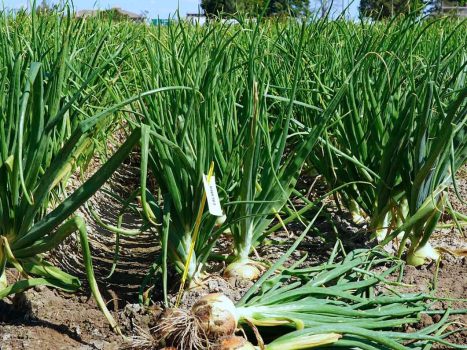When he celebrated his 100th birthday on June 24, Parma, Idaho-born Ray Obendorf reflected on his long and productive life in Idaho farming as well as some of the most astounding changes he’s seen in 100 trips around the sun.
Crediting genetics with his longevity, Ray added that staying in good physical shape and taking “everything in moderation” are important to as well. And as for farming from age 14, when he started with a half-acre plot of onions, to age 99 – grandson Brock Obendorf said 2022-23 was Grandpa Ray’s last season before retirement – Ray said his advice for success is simple: “Keep your nose to the grindstone, and be a man of your word.”
Born on the family homestead in Parma in 1923, Ray grew up with three siblings. The four Obendorf youngsters – Ray, brothers Orville and Bernard and sister Marie – attended school, finishing all grades. at Wilder. Their father died when Ray was 12, and at age 14, he began farming onions on a half-acre plot set aside for him by his mentor, Ora Newgen, who rented farmland from their mother. The onions were packed by J.C. Watson, he said.
The three brothers farmed together for a time, and in 1948 Ray started Obendorf Farms, with its primary crops of onions and hops. Hops were initially grown on 20 acres – today Obendorf Farms has over 3,000 acres of hops, 2,200 acres of row crops, and 1,000 head of cattle. And Obendorf Farms is now the largest hops grower in the state.
One year after starting the farm, Ray married his wife, Darlene, and the two raised son Greg and daughter Teresa in a house Ray built across the road from the original homestead. Darlene passed away in November 2006.
Ray remarried in 2008, and he and his wife, Carole continue to live in the Parma home.
Also a farmer, son Greg joined his father in 1977, and his sons, Brock, Phil, and Christian, came on as the farm grew.
Among the multitude of advancements, changes, and milestones that have occurred in the world – instant communication, transportation that can get people and goods around the world in hours rather than weeks and months, computerization of virtually every aspect of civilization and more than one “war to end all wars” – Ray Obendorf has seen in his lifetime, those in the somewhat smaller world of farming and packing amaze him.
He cited equipment – GPS and technology overall – and the effect on labor needs. Satellite positioning is used in planting; drip irrigation makes more efficient use of irrigation water during growing season; controlled storage can extend seasons and maintain quality; cameras detect internal defects on the line; electronic baggers increase efficiency in production. And control is at one’s fingertips with cell phone programming.
At age 100, Ray could kick back and not do a darn thing, but he enjoys getting out and seeing progress in the fields. He also enjoys time with family and friends, with some 200 well-wishers gathered at his century-mark celebration in June.
And he still loves his onions, preferring them scalloped.
A true onion man – Many Happy Returns, Ray!


